
 i_need_contribute
i_need_contribute

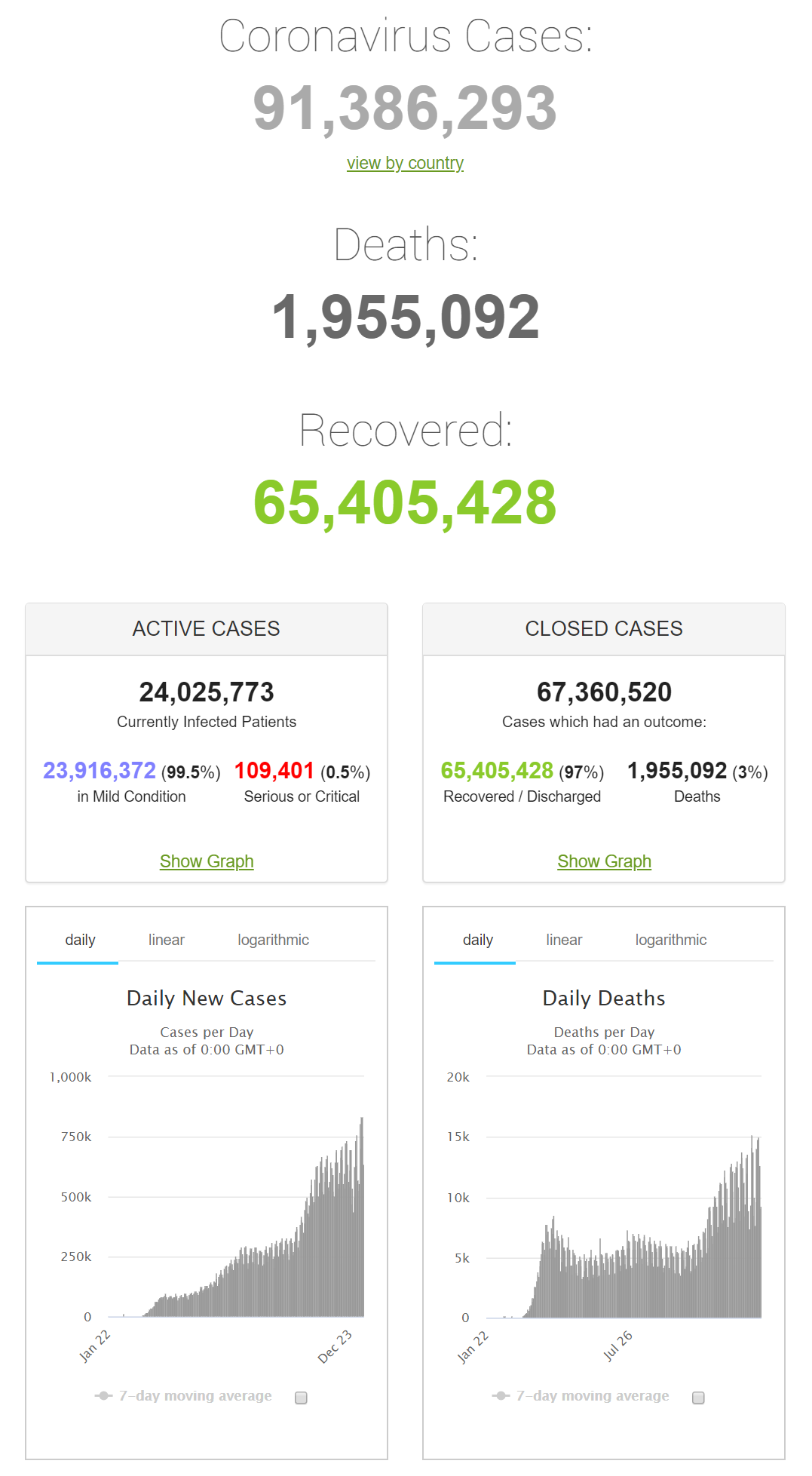
|
Country, |
Total |
New |
Total |
|
World |
91,304,822 |
+578,428 |
1,952,299 |
|
23,143,197 |
+214,683 |
385,249 |
|
|
10,479,913 |
+12,482 |
151,364 |
|
|
8,133,833 |
+28,043 |
203,617 |
|
|
3,425,269 |
+23,315 |
62,273 |
|
|
3,118,518 |
+46,169 |
81,960 |
|
|
2,786,838 |
+3,582 |
68,060 |
|
|
2,336,476 |
+10,220 |
22,981 |
|
|
2,289,021 |
+12,532 |
79,203 |
|
|
2,111,782 |
+24,631 |
52,275 |
|
|
1,941,119 |
+11,765 |
42,097 |
|
|
1,801,903 |
+15,003 |
46,451 |
|
|
1,730,921 |
+8,704 |
44,654 |
|
|
1,534,039 |
+10,003 |
133,706 |
|
|
1,390,385 |
+4,622 |
31,264 |
|
|
1,292,614 |
+6,208 |
56,262 |
|
|
1,246,643 |
+15,046 |
33,579 |
|
|
1,119,314 |
+4,288 |
19,835 |
|
|
1,037,350 |
+2,166 |
38,335 |
|
|
878,263 |
+5,416 |
12,411 |
|
|
836,718 |
+8,692 |
24,343 |
|
|
835,505 |
+4,292 |
13,419 |
|
|
673,271 |
+1,987 |
16,725 |
|
|
668,181 |
+7,892 |
17,086 |
|
|
664,263 |
+1,569 |
20,078 |
|
|
645,892 |
+3,969 |
17,162 |
|
|
603,739 |
+801 |
12,906 |
|
|
523,302 |
+849 |
7,803 |
|
|
504,293 |
+1,877 |
10,676 |
|
|
501,073 |
+9,754 |
3,704 |
|
|
489,734 |
+2,050 |
9,415 |
|
|
489,293 |
+5,604 |
7,925 |
|
|
452,988 |
+456 |
7,767 |
|
|
382,258 |
+1,536 |
6,747 |
|
|
363,949 |
+140 |
6,295 |
|
|
361,782 |
+2,093 |
3,610 |
|
|
343,656 |
+1,419 |
10,725 |
|
|
308,670 |
+1,461 |
4,043 |
|
|
286,752 |
+5,977 |
4,044 |
|
|
281,353 |
+2,157 |
4,500 |
|
|
265,268 |
+488 |
1,927 |
|
|
239,780 |
+551 |
2,796 |
|
|
232,982 |
+2,404 |
711 |
|
|
224,827 |
+176 |
2,926 |
|
|
222,391 |
+3,095 |
1,629 |
|
|
221,506 |
+436 |
14,184 |
|
|
220,223 |
+230 |
4,403 |
|
|
213,993 |
+1,792 |
1,526 |
|
|
209,131 |
+620 |
8,232 |
|
|
209,069 |
+860 |
3,007 |
|
|
Dominican |
183,282 |
+1,179 |
2,427 |
|
182,725 |
+1,239 |
1,597 |
|
|
180,061 |
+656 |
2,353 |
|
|
173,896 |
+1,098 |
9,376 |
|
|
163,019 |
+746 |
2,319 |
|
|
162,350 |
+3,074 |
5,284 |
|
|
162,288 |
+157 |
2,931 |
|
|
160,446 |
+775 |
2,232 |
|
|
154,841 |
+527 |
945 |
|
|
152,539 |
+4,926 |
2,352 |
|
|
150,753 |
+961 |
8,249 |
|
|
149,662 |
+271 |
3,156 |
|
|
148,171 |
+771 |
1,614 |
|
|
146,068 |
+203 |
246 |
|
|
145,179 |
+441 |
5,302 |
|
|
139,713 |
+432 |
3,022 |
|
|
138,224 |
+2,232 |
555 |
|
|
131,186 |
+582 |
2,858 |
|
|
130,780 |
+172 |
1,508 |
|
|
128,616 |
+300 |
2,003 |
|
|
127,945 |
+1,002 |
3,273 |
|
|
116,983 |
+373 |
1,073 |
|
|
116,535 |
+802 |
2,420 |
|
|
105,378 |
+633 |
1,589 |
|
|
102,369 |
+225 |
2,812 |
|
|
101,331 |
+1,244 |
1,361 |
|
|
98,334 |
+63 |
1,713 |
|
|
95,879 |
+321 |
356 |
|
|
87,536 |
+103 |
4,634 |
|
|
86,597 |
+103 |
2,635 |
|
|
82,380 |
+107 |
1,371 |
|
|
77,611 |
+39 |
617 |
|
|
69,114 |
+450 |
1,140 |
|
|
63,971 |
+376 |
1,247 |
|
|
58,929 |
+22 |
29 |
|
|
56,230 |
+458 |
338 |
|
|
55,903 |
+429 |
478 |
|
|
52,819 |
+388 |
729 |
|
|
49,899 |
+331 |
864 |
|
|
7,064 |
+56 |
138 |
|
|
6,068 |
+26 |
52 |
|
|
1,515 |
+1 |
35 |
Retrieved from: https://www.worldometers.info/coronavirus/
From CNN's Stephanie Halasz
The European Medicines Agency has received an application for conditional marketing authorization for the Covid-19 vaccine developed by AstraZeneca and Oxford University, it said in a statement Tuesday.
The EMA said it will proceed with the assessment "under an accelerated timeline" and an opinion on whether to issue an authorization could be made by January 29.
Conditional marketing authorization (CMA) is the process used to fast-track the authorization procedure and speed up approval of treatments and vaccines during public health emergencies.
"If the EMA concludes that the benefits of the vaccine outweigh its risks in protecting against Covid‑19, it will recommend granting a conditional marketing authorization. The European Commission will then fast-track its decision-making process with a view to granting a conditional marketing authorization valid in all EU and EEA Member States within days," the EMA said in a statement.
A decision could be made, "provided that the data submitted on the quality, safety and efficacy of the vaccine are sufficiently robust and complete and that any additional information required to complete the assessment is promptly submitted," the EMA said.
From CNN's Eric Cheung
Ireland recorded the highest Covid-19 infection rate in the world last week, according to statistics from Our World in Data, an online scientific publication based at the University of Oxford.
In the seven days leading up to January 10, Ireland reported 1,322.92 Covid-19 cases per 1 million people, the statistics showed, placing it above any other country over the same period.
Ireland has been facing a worsening Covid-19 outbreak: Last Friday, it reported the highest daily increase in coronavirus infections since the beginning of the pandemic, with 8,248 new cases, according to a statement from the country's Health Department.
The country has further tightened its lockdown measures since last week -- including closing non-essential construction sites, schools, and childcare services.
Ireland has reported a total of 152,539 Covid-19 cases and 2,352 deaths, according to a Johns Hopkins University tally.
From CNN's Luke McGee
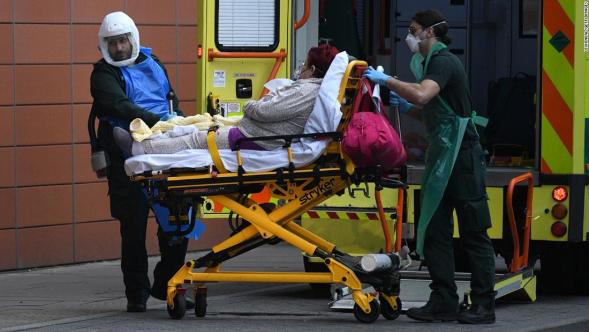
The United Kingdom is entering its most challenging weeks since the start of the Covid-19 pandemic, a top official said Monday, as hospitals face being overrun and morgues fill up.
"We're now at the worst point of this epidemic for the UK. In the future we will have the vaccine, but the numbers at the moment are higher than they were in the previous peak -- by some distance," England's chief medical officer Chris Whitty told the BBC, adding that he expects the next few weeks to be the "most dangerous time."
The country, which has already suffered more deaths as a result of the disease than any European nation and recently became the fifth country on earth to reach 3 million cases, is on the verge of seeing its hospitals overwhelmed.
Whitty told the BBC on Monday that there were currently more than 30,000 patients in hospital, compared to 18,000 during the first peak of the virus in the UK in April.
"We're now at a situation where in the UK as a whole, around one in 50 people is infected, and in London it's around 1 in 30," Whitty said. "There is a very high chance that if you meet someone unnecessarily, they will have Covid."
His warning comes with the country barely a week into its third national lockdown. But fears are growing that Britons are increasingly giving up on complying with the rules, as case numbers continue to surge despite the extreme measures.
Whitty stressed that minimizing contact with others will stop the situation from getting worse.
"Every single unnecessary contact any of us have is a potential link in a chain of transmission that will lead eventually to a vulnerable person," he told the BBC. "So, the absolute key is for all of us to think do we really need to have this contact?"
Retrieved from: https://edition.cnn.com/world/live-news/coronavirus-pandemic-vaccine-updates-01-12-21/index.html
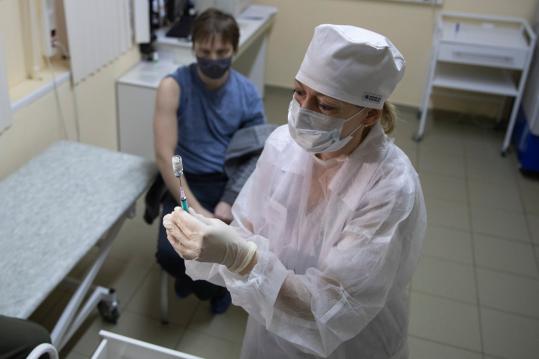
A medical worker preparing a dose of the Sputnik V vaccine in Moscow last month.Credit...Pavel Golovkin/Associated Press
Russian vaccine scientists on Monday began a study to determine whether they can hasten the country’s campaign of coronavirus inoculations by providing only a single dose of its normally two-dose vaccine.
The idea, also under consideration in Britain and other countries, is that a single dose could provide more than half of the protection offered by a two-dose vaccine. While each vaccinated person would be less protected than if they had undergone the full inoculation cycle, the approach could potentially save more lives in the population as a whole.
Russia’s vaccine, called Sputnik V, uses two types of genetically modified human adenoviruses, which are common cold viruses. The new approach would administer only a single type of the cold virus in one shot, the group that developed the vaccine, the Gamaleya Research Institute, said on Monday.
The institute, part of the Russian Ministry of Health, will study the single-dose approach, called Sputnik Light, in 150 volunteers in Moscow and St. Petersburg. It was not clear when it hoped for results or when Russia might decide whether to switch tack to a single-dose strategy.
The institute’s director, Aleksandr Gintsburg, said in December that the single shot was likely to prove about 85 percent effective but would vary for different categories of patients. The two-shot regime showed an efficacy rate of 91.4 in clinical trials. President Vladimir V. Putin suggested the new tactic in December.
In the United States, President-elect Joseph R. Biden Jr. plans to end the practice of reserving the second shots of two-dose Pfizer and Moderna vaccines for those who have received a first shot. His administration would instead distribute nearly all available vials immediately.
But Biden officials do not intend to forgo the second shot; vaccine production, they have said, is expected to ramp up to meet demand for second shots. The Food and Drug Administration has recommended against tweaking the dosage schedules, which have been carefully studied in clinical trials.
Retrieved from: https://www.nytimes.com/live/2021/01/11/world/covid-19-coronavirus/russia-considers-altering-its-vaccine-dosage-to-inoculate-more-people
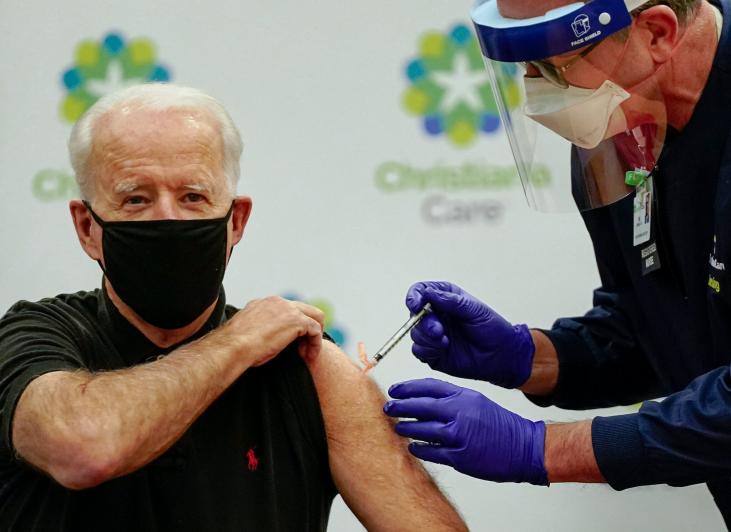
The second dose of coronavirus vaccine was given to President-elect Joseph R. Biden Jr. three weeks after the first.Credit...Amr Alfiky/The New York Times
President-elect Joseph R. Biden Jr. received his second dose of the Pfizer-BioNTech coronavirus vaccine on Monday, completing his inoculation against Covid-19.
Mr. Biden took his first dose of the vaccine on Dec. 21. At least 151,000 people in the United States have been fully vaccinated, as of Jan. 8, according to a New York Times survey of all 50 states.
“My No. 1 priority is getting vaccine into people’s arms,” Mr. Biden said after taking a quick needle jab. The president-elect said he and his advisers are finalizing a plan to accelerate mass vaccinations nationwide that he will release on Thursday.
“Three to four thousand people dying a day is just beyond the pale,” he said.
Mr. Biden lamented that mask-wearing continues to be a politically divisive issue, and said he was “appalled” to hear that, during last week’s storming of the U.S. Capitol, some Republican House members refused pleas from a Democratic colleague to don masks while they were crowded together in a secure protective location.
The United States reported 300,594 new cases on Friday and more than 4,100 deaths on Thursday, both single-day records, according to a Times database. In total, more than 376,000 have died from issues related to the virus in the United States.
The emergence of more contagious variants has added urgency to the country’s vaccine rollout, which has gotten off to a slow start.
Retrieved from: https://www.nytimes.com/live/2021/01/11/us/joe-biden-trump/biden-receives-his-second-vaccine-shot
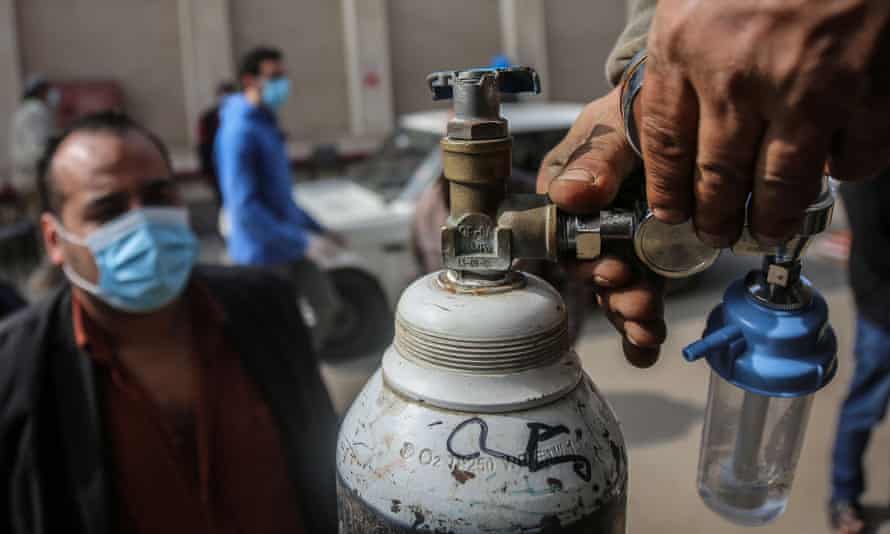
An oxygen cylinder is checked at the Gulf Gases Group factory in Nasr City oxygen cylinder before being sold to a customer whose relative is infected with Covid-19. Photograph: Fadel Dawod/dpa
Filming on his phone inside Egypt’s Hussainiya hospital, Ahmed Mamdouh pans around the ward to show beds occupied by motionless bodies. “All the people are dead,” he says. Mamdouh’s own relative had just died, for which he blames a lack of medical oxygen.
In another video, a screaming woman at Zeftah hospital in Gharbiyeh governorate demands nurses help resuscitate a relative. In a third, a man in Damanhour, in the Nile delta, gasps for air, glassy-eyed as he holds an oxygen mask in his hand. “There is a lack of oxygen,” he says, extending an invitation for local health minister to come and witness the problem. “Join us, minister.”
The footage has led to widespread concern in Egypt that there is a shortage of medical oxygen for Covid-19 patients as the country grapples with a rapid rise in infections and deaths. The government has denied any suggestion of a shortage, looking to reassure citizens during a pandemic that has been marked by a lack of accurate information – including about the level of vital supplies.
Medical oxygen is crucial for treating Covid-19. The World Health Organization estimates that one in every five Covid-19 patients “suffers respiratory distress sufficient to require oxygen therapy”. But the slightest issue with a hospital’s oxygen delivery system or the supply chain needed to refill oxygen cylinders – even something as benign as heavy traffic – can be fatal. Last week seven patients were rushed between the intensive care units of two hospitals in Sharqiya, after the oxygen delivery network failed.
Egyptian authorities moved quickly to quash the notion of oxygen shortages. The governor of Sharqiyah, Mamdouh Gharab, said four deaths at Hussainiya hospital were not due to a shortage of oxygen but complications from Covid-19, while accusing hospital security of being lax for allowing patients’ relatives to enter and film in the wards.
Sayed Rahmo, MP-elect of Sharqiyah, said five people had died as a result of staff negligence, claiming staff had mismanaged the depleted oxygen supplies. Public prosecutors later launched an inquiry into the deaths of seven patients at Hussainiya.
Egypt’s national news has repeatedly referred to an “oxygen crisis” in hospitals, while officials have blamed individuals for allegedly trading or stockpiling supplies. Al-Azhar, the highest Sunni Muslim religious institution, has issued a fatwa against “hoarding medical supplies”.
Egyptian Minister of Health Hala Zayed during a March 2020 press conference. She has insisted there is no shortage of medical oxygen. Photograph: Mohamed Hossam/EPA
Health minister Hala Zayed insisted that there was no shortage of medical oxygen, while the ministry’s spokesperson, Khaled Megahead, said the government had installed a new electronic system to monitor the supply of hospital beds and medical oxygen around the country. Prime minister Mostafa Madbouly demanded that producers double production of medical oxygen.
“The main problem is that there’s a lack of trust in what the government says, which is the real issue,” said Ayman Sabae, head of the healthcare startup Shamseya. “When the health ministry says it wasn’t an oxygen problem, people doubt this for many reasons. These things occurred in hospitals run by the ministry of health, which is also carrying out an investigation [into the deaths]. Then there are conflicting messages: On one hand, the government is saying there’s no shortage of the supply of oxygen, then you see civil society organisations collecting funds and donating oxygen tanks.”
Ahmed Mamdouh, who filmed in Hussainiya hospital, was questioned shortly afterwards by security forces. Prosecutors also summoned the hospital director and four doctors for questioning. This month the health ministry suspended and disciplined the director of a hospital in Kafr al-Sheikh who appealed on Facebook for oxygen cylinders. The ministry later reversed his suspension, but not disciplinary proceedings. Last year, security forces detained at least eight medical personnel for discussing the government’s handing of the pandemic.
Concern about a lack of oxygen supplies during a second wave of Covid-19 highlights the struggles of countries across the Middle East and Africa. One medical supply specialist in Zimbabwe tweeted about a desperate search for oxygen cylinders. Reports from South Africa suggest that hospitals are attempting to increase the supply of oxygen before the expected peak of the second wave in mid-January. Doctors across Africa said that a shortage of oxygen cylinders due to two companies dominating the market was putting patients at risk.
Oxygen supplies have been contentious since the start of the pandemic. In Iraq last July, families of Covid-19 patients seized oxygen tanks from the storage area of a teaching hospital amid fears supplies were about to run dry.
Egypt is recording more than 1,000 cases of the virus each day, but even health officials have admitted this is likely to be an undercount as there is no mass testing strategy. Zayed said her ministry’s official daily case count represented 10% of the likely cases. Many citizens avoid government-run hospitals until cases are advanced, meaning those admitted require more care.
“If we continue to have infections at this rate in Cairo, the hospitals will collapse and things will go out of control,” said a doctor working in Imbaba, Giza, who asked not to be identified. “Also, if doctors continue to die at this fast rate, we will enter a crisis,” they added.
The Egyptian Medical Syndicate reported that 290 doctors have died from Covid-19 so far.
The doctor working in Imbaba said monitoring efforts were in place to check on oxygen supplies, but doubted that the government’s new measures would be effective if cases continued rising. “Many things can go wrong due to the lack of transparency and the fact that no one wants to take responsibility. Several examples have shown that when doctors speak up they are the ones who are taken as a scapegoat and are blamed. The new measures will work just fine when the minster or a big official is visiting, but when we are overrun by patients they will not work,” they said.
Sabae said the biggest risk to Egypt’s healthcare infrastructure is pressure on staff. “The major defect is not infrastructure like the number of beds, it revolves around a potential shortage of medical personnel. Even all the money in the world can’t replicate trained doctors and nurses. This is a major concern … that we could reach a level where the medical personnel we have are completely overwhelmed with cases.”
Retrieved from: https://www.theguardian.com/global-development/2021/jan/12/egypt-denies-oxygen-crisis-as-covid-19-ward-videos-allege-shortage